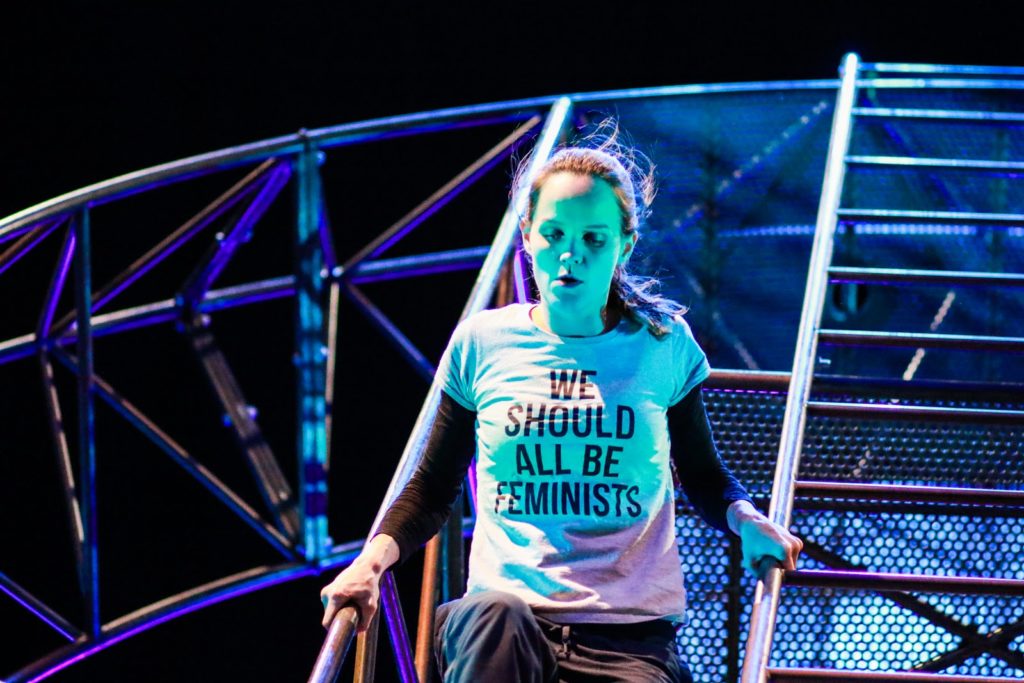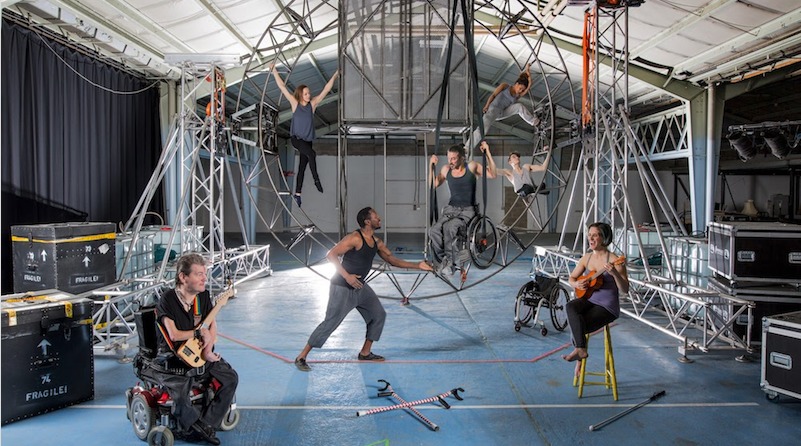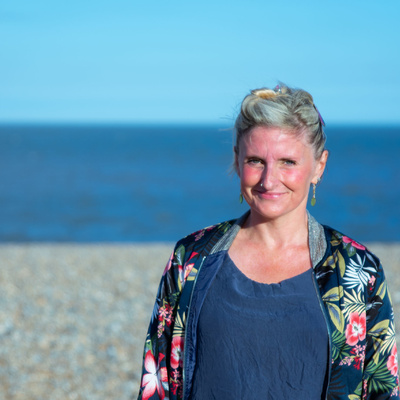Circus For Every Body–The Extraordinary Bodies Story So Far
We set up Extraordinary Bodies in the flurry of optimism that followed the Olympics in the UK in 2012. We are an integrated circus company of disabled and non-disabled artists that create shows and work with communities to develop future artists. The Paralympics in 2012 changed perceptions of what was possible and disabled athletes were finally visible. I had been on my own exciting journey during 2012 that culminated in co-creating an opening ceremony for the sailing and windsurfing events to a live audience of 11,000 people.
At the time, I ran a youth company of young disabled people who had told me very clearly that they wanted to be part of an Olympic ceremony– so I felt I should make that happen. I met Billy Alwen from Cirque Bijou at a meeting in 2010. He was developing the idea that would become the opening ceremony and was looking to make it more inclusive of disabled people. I told Billy I had a young company who wanted to be part of it and off we went on the adventure. The young people were central to the show and we brought them together with young disabled people from Brazil. Our young company travelled to Florianopolis and the young Brazilians travelled back to perform as part of the ceremony. Young people flew from cranes and took centre stage as the Navy delivered performers by boat. 2012 people walked into the sea carrying flaming torches in a spectacular ending. Internationally successful disabled artists Alex Bulmer, Dave Toole and Jamie Beddard worked with us and led artistically to realise this vision.
The world is run by an unrepresentative group of people with a narrow lived experience. We want to change that.
At the end of that summer, Billy met me in a cafe at Bristol airport and asked me whether I would like to set up a professional circus company of disabled and non-disabled artists. I said yes on the spot. That was because of my experience of working with circus artists in the lead up to the ceremony. My experience as a director is in theatre and dance and I had come to love the way the circus community worked. It was new to me. They were open to learning about accessibility, welcoming to all and understood risk. If you work with young disabled people as I do, you observe that non-disabled people often block them from taking part in an experience because it is ‘risky’. This is often a knee-jerk reaction rather than based in actual risk and because of a society that sees disabled bodies as ‘fragile’. Many non-disabled bodies are ‘fragile’. What was new to me were people who were willing to take risks because they understood the real process necessary to assess it. It was an exciting moment and a legacy of the work we had all done together.

So we plunged in headfirst. We made our first show Weighting with many recent graduates of Circus Space (now the National Centre for Circus Arts) and established disabled artists from theatre and dance. The disabled artists were in the main crossing over into a new discipline. We held annual auditions and invited other circus companies to see the talented disabled artists who were auditioning. Although disability may be the clearest visible difference about the company, we have always had an equal commitment to race and gender equality in creative teams and casts. We work to make teams replicate the make up of the UK population in terms of identity .
From the first show we undertook participation and community work. We had large community choirs perform within the shows, offered workshops in circus to communities as we toured the shows and developed 10 unexpected leaders across the UK. Unexpected leaders are people we find in communities who have leadership potential but have experienced barriers. Quite simply, if they had more privilege they would be running projects, a company, and the world. The participatory work has been central to our work because it is where we have found new talent (disabled people and other marginalised groups do not often go through conventional training routes). During the pandemic we are developing another set of unexpected leaders from marginalised backgrounds. We believe that training potential leaders will bring about change in the arts and society. Having different leaders in all fields will bring about new thinking and better ways of living our lives. The world is run by an unrepresentative group of people with a narrow lived experience. We want to change that.
We have a particular style and way of working as a company. This is understood by us all but we don’t often articulate it. We devise our work through physical experimentation in a rehearsal space. We always have musicians and composers in the space as well as a writer. The shows we make try to tell different stories with different bodies. Extraordinary Bodies works with artists who have physical impairments, sensory impairments (Visually impaired or Deaf ) and artists who are learning-disabled. All of our shows are audio described and British Sign Language interpreted. We have original scores and live music. The artists in the room collaborate together to create material. Co-director Billy Alwen and I then often shape and edit everyone’s ideas into a whole. It is complex to create a story, circus, characters, spoken words and music simultaneously. We like to add to this complexity by creating new unique steel structures that enable new types of aerial to take place. The equipment we use in circus is designed for performers with conventional bodies. We like to create new equipment so everyone – disabled and non-disabled is finding a new physical language.
I write this in challenging times and at a time when the UK is becoming more parochial and less internationalist. Covid has impacted disabled people disproportionately. It has shown the inequality of wealth, and exposed the eroded and under-resourced health service and social care systems in the UK. Where we are was not inevitable. It is a heart-breaking time. Many of our collaborators are European and we don’t yet fully understand how Brexit will affect all of our work with them going forward. Our commitment since the start has to be Radical, Joyous and Bold and we try to live these values now in this moment.

Since the start of lockdown we have remained connected as a community of artists. We made a short film together shot in our first lockdown on camera phones. We have had a live cabaret night around a virtual fire. Artists have run physical exploration sessions on zoom with communities. Extraordinary Bodies commissioned our performers to create six digital experiments – these are collectively called Digi Tales and will soon to be unleashed on the world (they are amazing). We are currently developing six unexpected leaders across the UK. We use Zoom, Slack, camera phones, binaural headphones, podcast tech, mini tripods, posting things to each other, What’s app , voice memos, and the odd phone call to communicate. We are creating together and have started the making of our new show. We are rehearsing remotely but talking all the time. It is a slower way but we are working out a process of rehearsing online. A truly diverse company means that people have different levels of vulnerability. But in truth, we will need vaccinations to enable us to be together in person.
Because we are joyous and bold, we are buying our own big top tent. It is being made in Italy and we look forward to its arrival at the end of this year. This will enable us to tour to new places and to work with partners who have booked us before in new ways. Extraordinary Bodies will perform in our tent and theatres when they reopen. The tent will also give us a space to run our community work and to rehearse. Our tent will be accessible, with a flat audience area and a variety of seating options. We are working on green heating because warmth is crucial to people who have limited mobility and to the well being of everyone. I see this as an exciting evolution in our journey as a circus company.
Every week at the moment we have Zoom workshops with communities in Plymouth, Poole and Rochdale. Like ourselves, the participants are variously learning disabled, disabled, in recovery, elders, ethnically diverse, trans, straight and gay. I remember in each of these sessions that the way we become more equal is to listen and to understand another’s experience and to act to make sure that all lived experience is amplified and supported.
We are 11 years into our journey. The shows have been a part of it but not the biggest part. The biggest part has been the growing of a family of artists and our relationships with communities. We continue to make artistic work slowly and using new means but we are together still and ready for the next decade, one in which we are hopeful there will be great social change that sees the value and worth of all humans.
Six Tips Extraordinary Bodies Recommends to Make More Inclusive Circus
1. Ensure every performance is understood by everyone – Include audio description and Sign language interpretation in every show. Everyone should be able to understand any show. If it is only added for specific dates it won’t be woven into the fabric of the show or considered as part of the artistic offer. Try not to talk about how intrusive audio description is to your experience if you are sighted.
2. Create strong relationships with the communities you are trying to reach and ensure they are represented onstage – If you want Deaf audiences to come to your shows, you will need to have a relationship with the local Deaf social club. You might send Deaf artists and other artists with interpreters to the local scene. Many people do not access print marketing.
3. Leadership is better if shared –A diverse range of perspectives will always reach better solutions through cognitive diversity and all that. We share leadership of projects throughout the company and directly with the Unexpected Leaders/communities and artists who are performing. Everyone leads the work and innovates and suggests ways forward. We co-direct all shows and have a creative team of performers/composers/writers who are all contributing. It is never one person’s vision.
4. Development and support of artists –Relationships with performers are over many years and don’t end when they are not in a particular show. Investment in an artists development benefits everyone. A visually impaired aerialist is advising us on the audio description within our current show. Does it work ? Can she imagine through the soundscape what others are seeing onstage?
5. Finding talent is central focus –Because of systems of oppression, talent is everywhere but opportunity is not. Work to find people. They won’t come to you.
6. Participatory work is essential– Community work/engagement work is where we find future artists and leaders of tomorrow. We work in communities over long periods of time running workshops and involving them as performers in shows. We find a lot of talent this way.
Resources
- What Do You See In Me? Short film.
- Screening and live conversationCircus Toolkit – Requires login details to access PDF, which will remain with Extraordinary Bodies- GDPR compliant
.All photos provided courtesy of Extraordinary Bodies. Feature photo:Seven performers, disabled and non disabled surround a steel circular structure that they hang from. Two artists seated in front play stringed unique instruments. Crutches lay on the floor. An artist who is a wheelchair user is suspended in his wheelchair from the structure. Feature photo credit: Paul Blakemore Do you have a story to share? Submit your news story, article or press release.



